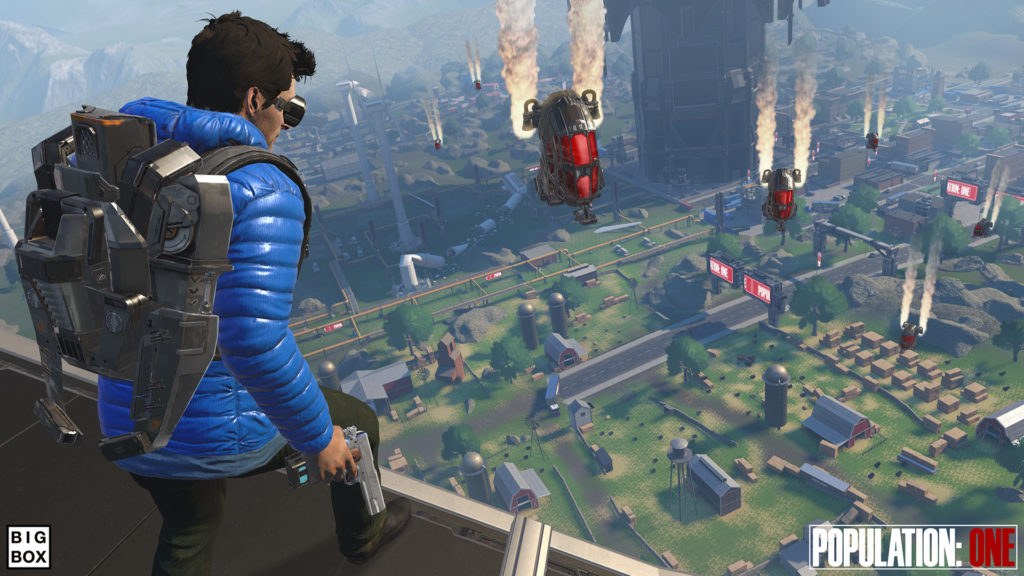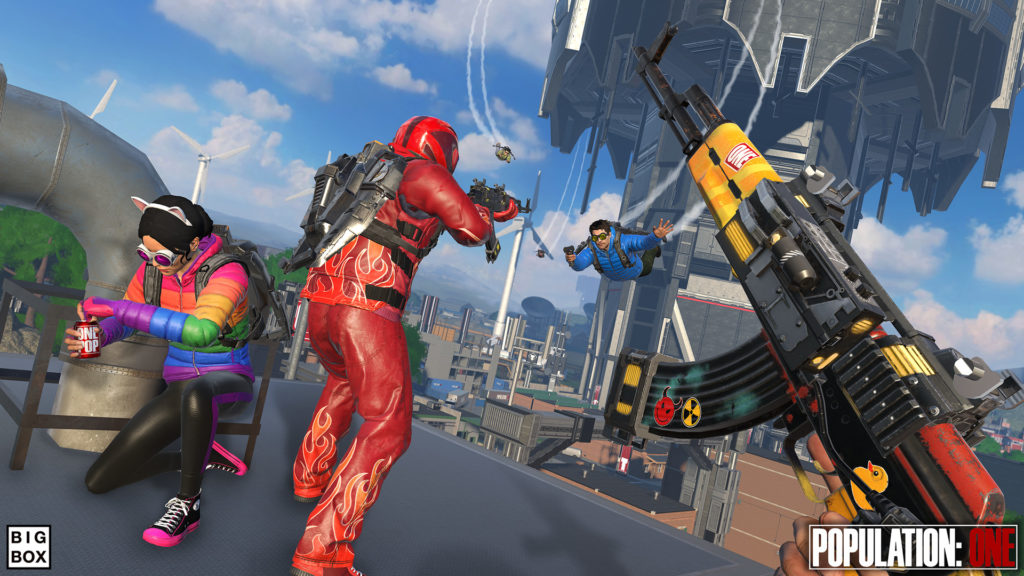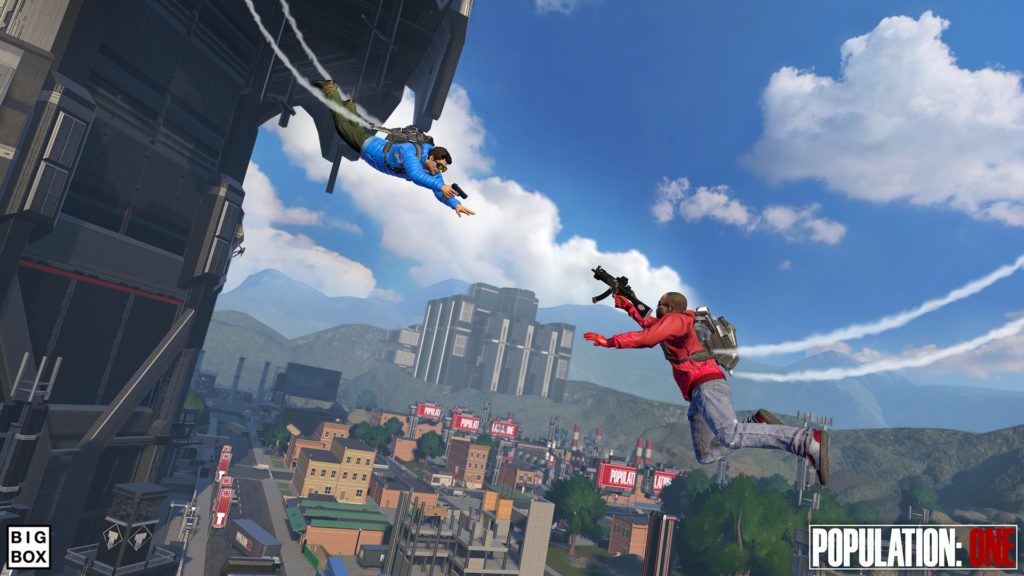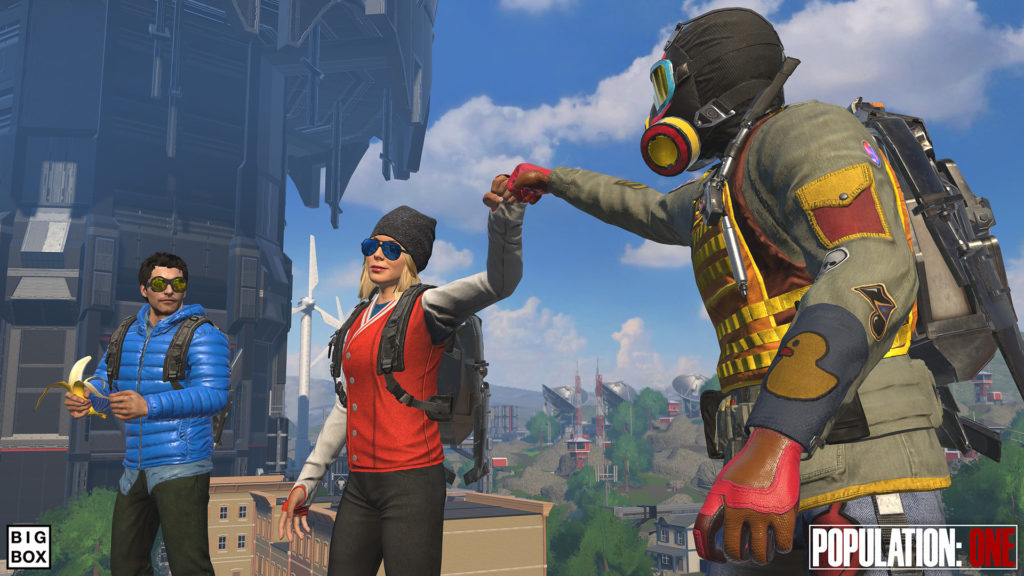Developer BigBox VR gives us the low down on their ambitious VR battle royale game.
Population: One is a vertigo-inducing VR battle royale experience that pits six teams of three against one another for the honor of “Last Team Standing.” Players begin by airdropping onto a sizable map filled with various weapons and equipment to loot and structures to scale.
From there they’ll need to quickly outfit themselves with increasingly powerful weaponry, shields, and health items before heading into battle. As the match progresses the map will shrink in size, forcing teams into conflict as a deadly red barrier continues to encroach on their positions.
While Population: One includes many features one would expect from a modern-age battle royale experience, the game sets itself apart with its vertical climbing system. Put simply, every object and structure you see on the map is 100% climbable. This opens up a wide range of strategic possibilities, allowing players to position themselves in unique locations that would be near impossible to replicate in conventional console/PC battle royales.
When you find yourself on the high ground, you can expand your arms in a “t-pose” position to glide forward like a majestic flying squirrel, allowing you to navigate large portions of the map with ease. You can also craft walkways and barriers à la Fortnite, a useful mechanic when you find yourself caught out in the open.

Combine these features with some tight VR gunplay, a satisfying progression system, and several engaging social elements and you have what could easily be considered the most polished battle royale experience available on VR headsets. That being said the game isn’t without its flaws. After several hours with the game, we came across several instances of lag and various other connection issues.
The party system also feels a bit convoluted compared to other battle royale games. Population: One relies on an old-school friend system that requires you to enter a lengthy code in order to befriend a fellow player. Not a dealbreaker, per say, but definitely an unnecessarily awkward experience, especially in 2020.

In terms of existing content, Population: One features a variety of player characters and gun skins to unlock as you play. While the current offerings feel sparse, developer BigBox is already in development of numerous updates and improvements. Eventually, the team will be launching seasonal updates similar to existing battle royale games, introducing big changes to the core game experience in the process.
Earlier this week we sat down with Chia Chin Lee (CEO) and Gabe Brown (VP Engineering) to get the low down on their competitive multiplayer experience:
What sets Population: One apart from other battle royale games?
CCL – “I think one of the biggest things we wanted to accomplish right away was just to make sure that we create games that are only possible in VR, so that’s like the foundation of our company and an online multiplayer and VR really we wanted to put the players within. Within that world, be able to literally reach out and climb anything that they see and fly anywhere and create their own strategies or combat the key piece of the element that was always there, even from day one, like three years ago when we started the project, roughly was climbing.”

GB – “And it was later, about a year in its development, Chia Chin was just like, “It’s missing something.” It’s like he’s tasting the soup and it’s like it needs more paprika. That’s when flying kind of came up as one of the things that he tried and was like, “Oh yeah, this is going to make a big difference.”
What did it take to bring Population: One to the Oculus Quest/Quest 2?
GB – “We spent about a year basically rewriting some very core pieces of our tech for the mobile platform. So a lot of what you see in population one is actually a lot of purpose-built built special tech designed to run on a mobile chipset, particularly the Quest 1 and the Quest 2.
So we have our own physical system. We have our own render pipeline. And then also one of the biggest challenges you see in a lot of games is the draw distance. So you could see a full kilometer, you can see the other end of the map. And a lot of game developers hide this by making corridors and turning up the fog so you can’t see that far. So you can hide the detail in the background and reduce the rendering cost.

But for us, because the vertical combat system allows you to go anywhere in the world, it means we really couldn’t sacrifice, especially for long-range range combat with sniper rifles, you can’t really sacrifice that render distance. So there’s a ton of tech that goes into making that run extremely fast.”
What are some solid tips & tricks for new players?
CCL – “A lot of new players, when they climb, they do these “baby climbs.” As they get better, they realize: big climbs. Not only big climbs, but you actually fling yourself; you kind of grab-and-fling.
You can actually create momentum and go upwards a lot faster. But another one is that in our game, intentionally, we don’t let people sprint around the world. What happens is if you want to go a lot faster, like if you’re trying to escape the zone, you can climb really, really fast and then fly, because the fly speed is much faster than the walk speed.”
What’s the response been like since launch?
CCL – “The response has been awesome. People have been really excited. Lots of people streaming it, and it’s been fun to watch. We’ve had popular musicians stream it, EA Sports people stream it, and it’s just fun to watch people form squads, befriend each other, and then go and meet other people and battle them in VR.
You know, we started this company believing in VR and social and online. And so far it’s really validated our thesis.”
Population: One is available now for $29.99 on SteamVR, Oculus Rift, and Oculus Quest headsets.
Image Credit: BigBox VR Inc.
The post Inside ‘POPULATION: ONE’ – Developer Interview & HD Gameplay appeared first on VRScout.
from VRScout https://ift.tt/3mvYhkB
via IFTTT
No comments:
Post a Comment